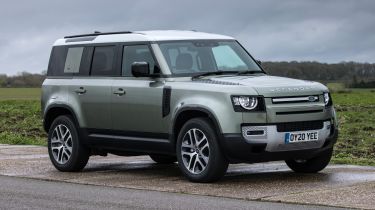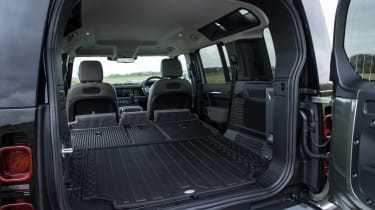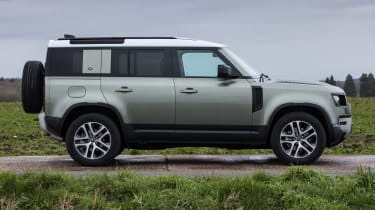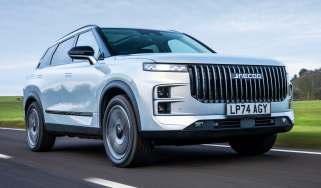Land Rover Defender 110 review
After a long hiatus, the all-new Land Rover Defender 110 is here. We’ve driven it to see it can live up to the iconic original
Over almost 60 years of production, we’ve seen the Series I, II and III models of the original Land Rover, followed by the legendary Defender version in 1983. Until production finally ended in 2016, the Defender remained somewhat familiar, only undergoing small tweaks and updates over the years without any sign of a replacement.
Best 4x4s and SUVs to buy in 2020
The all-new Land Rover Defender 110 has now arrived and it’s one of the most exciting new cars of 2020. It’s the first model in the new Defender line-up, with a three-door Defender 90 and a commercial version set to arrive in the coming months.
Land Rover Defender 110: design and interior
The new Defender borrows several design cues from the original car, with a strikingly angular look and widened side flanks, combined with the supersized dimensions of a modern family-sized 4x4. A closer look at the styling reveals details such as the front and rear light clusters, the rectangular front grille that dominates the nose of the car, and the tailgate mounted spare wheel - all a clear tribute to the original.
Step inside, and you're greeted with a thoroughly modern interior that’s incomparable to anything else in the sector. There’s a blend of rugged and luxury materials dotted around the interior, with exposed screw heads, aluminium surfaces and a magnesium bulkhead stamped with the iconic ‘Defender’ nameplate. While it’s not the type of luxury you’d find in a Land Rover Discovery, it does have a cool look and feel.
Technology
One area in which the new Defender has moved forward massively is the onboard tech, with a slick digital instrument cluster, and a new 10-inch infotainment touchscreen, which is the best setup we’ve seen in a JLR car. Called Pivi Pro, it’s intuitive and easy to use and offers over-the-air software updates, Apple CarPlay and Android Auto smartphone connectivity, and music streaming.
This setup also incorporates the car’s ClearSight Mirror, which acts as a traditional rear-view mirror and as a display screen showing a feed from a rear-mounted camera. For off-roading, the ClearSight Ground View system uses front-mounted cameras to project the view through the bonnet of the car, showing the terrain ahead via the dash-mounted infotainment screen.
Practicality
The new Defender has also been designed with usability in mind, with a cavernous central storage bin and large door pockets. It can also be customised to suit your needs, with even a fridge on the options list. More practical features such as an extra front seat are also available, or if you wish, the removal of the central storage bin is also an option.
You can also add a pair of rear seats in the boot to make your Defender 110 a seven-seater, although this option cannot be combined with the third front seat. The rear seats boast plentiful amounts of space for passengers, sliding forward to allow access to the third row, which offers a decent amount of space for children and smaller adults. One piece of smart design is that every passenger gets their own power outlet and air vents.
The car’s growth spurt means that boot space is excellent, with 231 litres with three rows of seating in place rising to 916 litres with two rows. A vast 2,233 litres is available with all the rear seats folded into the floor.
Trim levels and options
Buyers can spec a Defender 110 in a range of trim levels ranging from the utilitarian S and SE models, all the way to the plusher HSE, First Edition and X models. If choosing a trim wasn’t difficult enough, Land Rover offers several optional packs, including Explorer, Adventure, Country and Urban, which add kit including roof racks, storage boxes and even a snorkel to ensure you can wade through deep water on the school run.
Engines, drive and performance
So, we’ve established that the design of the new Defender lives up to the iconic name, but how does it drive?
Our test car is an S trim model equipped with a turbocharged 2.0-litre four-cylinder diesel engine producing 237bhp. You can opt for a lesser powered 197bhp diesel as well, along with two petrols, a 296bhp four-cylinder P300, and a straight-six mild-hybrid with 395bhp, badged P400.
While JLR’s Ingenium D240 engine is available across the Land Rover lineup, it seems best suited to the Defender 110. Offering spritely acceleration considering this is a heavy car, it manages 0-62mph in 8.7 seconds. Throttle response is good both around town and for motorway driving. The car’s stereo system can be used to enhance the engine noise.
Fuel economy is reasonable at best, with Land Rover claiming 31.4mpg and emissions of 236g/km. You can expect an mpg figure in the high twenties in real-world driving.
And for those that think the Defender 110 is too similar to the Discovery, it’s clear from a short drive that both cars, despite sharing many similarities, are very different. The Defender 110 offers a hint more precision than the Discovery, with a sporty feel about it thanks to faster steering and a firmer air suspension setup. It also offers more feedback to the driver when cornering, with a surprisingly grippy front end.Even in faster corners, trying to unsettle the Defender 110 proved difficult, with it remaining flat and composed despite provocation. Land Rover has succeeded, rather unexpectedly given the car’s bulk, in making the Defender fun to drive.
At faster commuting speeds, the rectangular front-end does cause a bit of wind roar, but aside from this, it's quiet and refined with a stable feel about it.
Like the old car, the new Defender 110 can go where other cars can only dream of thanks to its twin-speed gearbox, locking centre and active rear locking differentials, and air suspension, which are all controlled by Land Rover’s clever Terrain Response technology. This setup is controlled by the infotainment touchscreen but can also be activated by a shortcut with a simple press of one button and the use of an air-con control dial - a clever way of decluttering the dashboard layout.
Adding to the Defender 110’s already vast breadth of abilities is its substantial towing ability of up to 3,500kg. The car’s smartly designed tech comes into play here too, with rear-mounted cameras to help you line up a trailer, and air suspension that will lower the car and then raise it up to make coupling a breeze.
Verdict 5/5
The new Defender 110 had a big name to live up to and it's succeeded in all areas. The design, technology and engineering make it one of the most competent cars you can buy today. It’s unexpectedly fun to drive on the road, with all of the off-road ability you’ll ever need. Add to this the cool design and brilliant interior, plus a competitive starting price next to its direct rivals, and the new Defender looks like decent value for money too. Essentially, it's everything we wanted the new Defender to be and more.
Recommended

New Subaru Trailseeker revealed as rugged electric SUV with 375bhp

New Subaru Solterra brings more range, power and polish
Most Popular
Tips & advice

Car dashboard warning lights: what does each symbol mean?

Electric car charging stations: public networks, charger types, apps and maps












